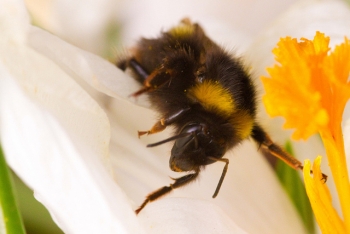How to Prevent Bees in Your Yard

You probably already know that while bees are a nuisance and give a painful sting, they are actually beneficial insects. Bees are responsible for pollinating many of the plants that become our food. They are an important part of the ecological system. Believe it or not, but about a third of our daily diet can be attributed to pollinators. And we cannot forget that honey bees give us a particularly pleasant dietary addition! However beneficial bees may be, even the sweet honeybee is an unwelcome resident in your yard and home. Keeping bees in their proper place keeps both human and insect safe from one other.
Attraction
The trouble with bees is that they like a lot of the same things as people do when it comes to lodging and accommodations. Good food, plenty to drink and a nice, safe place to rest will make us both happy and willing to stick around for a while. Oftentimes, people give bees exactly what they like best without realizing it. Then they have to find a way to get rid of the bees, possibly incurring stings and bills for bee pest control services in the process.
Remove the Food
Before you call in a Phoenix bee exterminator, makes sure you aren’t inadvertently attracting bees in the first place. An ample food source is one the biggest attractions for bees. We humans call this a garden or trash can or even a deck. Remove the source of food and the bees will look for a nesting spot somewhere else.
Unfortunately, this isn’t as easy as it sounds. We humans like our pretty garden flowers and so do bees. No one wants a barren wasteland for a yard so totally eliminating food may not be advisable. You can take care of the other food sources, like garbage and rotting wood. Bees and wasps will feed on sugary leftovers in trash cans so keep the lids on tightly.
Carpenter bees like to munch on soft wood so be sure your deck is kept in good repair. Look for weathered or rotting wood on sheds, fences and other wooden structures. Inspect your firewood pile regularly and remove any excess building materials to a dry area for storage.
Watch the Water
Bees need water both to consume for their own bodies and to bring back to the hive. Limiting or removing water sources can make your property less attractive as a nesting site. If you have a pond or stream on your property, your options for control may be limited. For other water sources, you can exercise preventative measures.
Cover pools when they aren’t in use. Make sure rain water does not collect on top of the cover as well. Put a tablespoon or two of vinegar into your pest water bowl or trough so bees will avoid it. The same trick works for bird baths. Eliminate standing water like that in puddles or empty containers. (This will also help prevent mosquitos!)
Give no Shelter
Getting rid of places to nest is perhaps the best, most effective way to prevent bees from establishing a colony in your yard or home. Here are a few ways to make sure they are offered no shelter on your property.
- Cover attic vents with mesh.
- Caulk cracks in the foundation, walls and roof.
- Fill in animal burrows or holes as some bees and wasps nest in the ground.
- Keep shed doors closed tightly. Consider installing auto-close hinges
- Remove debris in your yard like pots, tires, boxes, crates, appliances and immobile vehicles that offer shelter to pests.
- Fill holes in trees and block walls. Anything larger than 1/8 inch should be filled.
Once you have eliminated the food, water and shelter options, bees and wasps will have no other choice but to look for a home on someone else’s land. If you do find bees, don’t try to treat them yourself. Call in a Phoenix exterminator like Invader Pest Management.
